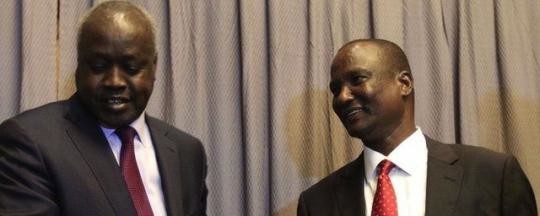The chief negotiator for the government of South Sudan says he is ‘cautiously optimistic’ about peace talks with the armed opposition led by Riek Machar, citing modest progress in some areas of discussion.
Upon his arrival at Juba Airport today, chief negotiator Nhial Deng explained to journalists that the talks were suspended until 23 April, at the same time as an SPLM intra-party dialogue forum started in Addis Ababa.
Negotiations had effectively stopped a week ago, but the delegations of the two parties remained in Addis Ababa until the return of Ethiopian Prime Minister Hailemariam Dessalegn, who met with them on Saturday.
In remarks on Sunday, Nhial referred to the controversy over the role of the SPLM-G7 faction, which the government sought to exclude from the talks, as well as the issue of the ceasefire.
He made the following statement:
“One main outstanding issue between us and the rebels is basically what issues should we discuss now as two warring parties, and what issues are best left to a broader gathering of all the other political forces? We have taken the view that it’s important for us to look at the issues that have got direct relevance and bearing on a permanent ceasefire, because we are demanding the permanent ceasefire to be one of the agenda items.
“So we are ready to discuss issues that are related to a permanent ceasefire, but there are certain issues that we think are best discussed in the context of a broader dialogue that will bring in all the other political forces, civil society, indeed all the stakeholders. But the rebels hold the position that they would want everything to be discussed at the table of negotiations in Addis.
“So we are still working our way to forging maybe closer consensus on these outstanding issues. We are supposed to report to Addis on the 22nd of April and then resume the negotiations on the 23rd.
“Well, we are cautiously optimistic because as I said we have made some progress, although it is modest progress, but I think it’s good that at least we have agreed on the outlines of an agenda, what to discuss.
“The issue of the seven detainees I think is on it’s way to being resolved, because it has been an obstacle – we have spent quite a lot of time not actually negotiating directly with the other side simply because it was felt by IGAD and the mediators that the detainees should play a role.
“We accept that the detainees have a role to play, but we think that role can only be played alongside other political forces and when issues that are of relevance to the detainees are being discussed. But now we would like the talks to be restricted to the two sides, the government and the rebel group, because you need to restore peace as soon as possible, you need to stop the fighting and the bloodletting, and this can only be done by the parties that are carrying weapons, and these are the two warring sides.
“The former detainees have other forums in which they can be engaged, and as a matter of fact as we left Addis the launch was made of the intra-SPLM dialogue, you know, so that’s a separate forum. And the former detainees as senior members of the SPLM have the possibility to use that forum in order to discuss whatever grievances they have.
“But now IGAD’s position is softening a little bit, I mean IGAD has now indicated a willingness to accept that the current phase of the negotiations be confined to the warring parties and perhaps bringing in the former detainees and other stakeholders at a later stage.”
File photo: Nhial Deng (left) and Taban Deng (right), chief negotiators of the two parties at South Sudanese peace talks in Addis Ababa (BBC)




